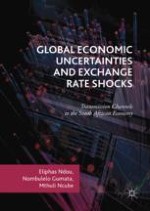
2017 | OriginalPaper | Chapter
1. Introduction
Authors : Eliphas Ndou, Nombulelo Gumata, Mthuli Ncube
Published in: Global Economic Uncertainties and Exchange Rate Shocks
Publisher: Springer International Publishing
Activate our intelligent search to find suitable subject content or patents.
Select sections of text to find matching patents with Artificial Intelligence. powered by
Select sections of text to find additional relevant content using AI-assisted search. powered by